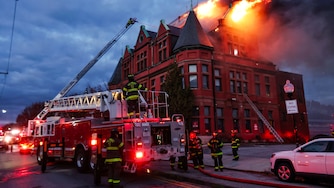Baltimore Housing Commissioner Alice Kennedy, who helped spearhead an ambitious plan to tackle the city’s glut of vacant properties, will step down in November.
Kennedy will transition into another government role, not immediately announced, leaving Baltimore’s top housing job up for grabs for the first time in Mayor Brandon Scott’s tenure.
The housing commissioner is the second high-profile staffer in the Scott administration to vacate their position within the last week. Justin Williams, the deputy mayor for economic development who supervised the housing department, dropped the deputy mayor title to become the city’s chief “permits czar.”
In a Friday night statement, Scott thanked Kennedy for her service and credited her as the “chief architect” of the vacant housing initiative. Kennedy, in the same news release, said she was proud of her accomplishments, including “taking on challenges that have been ignored for far too long.”
The personnel changes come amid outcry from residents and the business community over the implementation of the city’s new permitting system. Intended to reduce backlogs, the new system instead throttled the number of permits the city issued. As the misfire came to light, Scott publicly promised that “folks will be looking for employment elsewhere” if the situation didn’t improve.
Remedies have been slow. By the end of June, the average number of permits issued each month remained lower — by more than 800 — than any year since 2015.
Kennedy worked her way up the sprawling department from a project manager role focused on environmental projects into one of the most influential and public-facing positions in city government. She served as deputy commissioner of the department from 2016 until her appointment as the interim commissioner in 2020, when she took over for former Commissioner Michael Braverman.
Scott made the title permanent in 2021.
Kennedy faced an early test. In West Baltimore, a stalled development left the historically Black and working-class Poppleton neighborhood in shambles, with vacant and abandoned properties causing problems for residents and neighbors being made to move out as the developer took control of their homes. One homeowner, Sonia Eaddy, fought the city’s taking of her home, causing uproar over the state of the neighborhood and the forced displacement of a community.
Under Kennedy, the city negotiated with the developer, the New York-based La Cité, and allowed Eaddy to keep her house. It also preserved 11 historic “alley houses” that were in danger of being demolished. At a news conference announcing the arrangement in mid-2022, Kennedy and Eaddy embraced.

Kennedy devoted much of her schedule to public gatherings and neighborhood events, including regular “coffee breaks” akin to office hours and community walks, town halls and meetings.
She also tried to revamp a number of the agency’s programs, including streamlining its “dollar house” initiative, modernizing illegal dumping surveillance techniques and becoming a more aggressive voice in the fight against vacants.
But developers and the city’s business class held Kennedy responsible for ineffective permitting and inspection divisions that delayed housing and economic development projects large and small. When the overhaul of the permitting system implemented this year backfired, Kennedy was vulnerable to criticism.
“This is not how we want to do business,” she said. “We are not there yet, and I believe you all know we are not there yet.”
Meanwhile, some have criticized the city for being slow to ramp up its vacant housing reduction effort.
In addition to permits, Kennedy’s job oversees code enforcement; homeownership and preservation programs; development; and finance duties — an agency of about 400 people. In 2024, she was appointed vice chair of the Baltimore Vacants Reinvestment Council, a committee formed by Scott and Gov. Wes Moore as they sought to firm up their grasp of vacant housing stock. It’s unclear if Kennedy will keep her position on the council as she steps down from the commissioner role.
She attended one such council meeting Wednesday, sitting alongside some of the city’s and state’s most prominent movers and shakers. As the city has sought to gain control of its vacant homes and land, Kennedy has pulled ideas from all corners of the country. She is credited for helping to introduce a never-before-seen bonding initiative that can be rolled out across neighborhoods.
The noncontiguous tax increment financing district, or TIF district, is one of the centerpieces of the ambitious plan to attack Baltimore’s vacant homes rolled out by Scott in partnership with BUILD and the Greater Baltimore Committee in 2023. The idea to target some of the city’s most beleaguered housing stock with TIF bonds has divided members of City Hall for its relative level of financial risk, but Kennedy defended it as an innovative tool that can push Baltimore forward.
Kennedy earned more than $207,000, according to the latest city salary records. It wasn’t clear when her next job title would be announced.



Comments
Welcome to The Banner's subscriber-only commenting community. Please review our community guidelines.